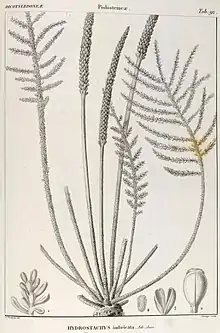| Hydrostachys | |
|---|---|
 | |
| Hydrostachys imbricata | |
| Scientific classification | |
| Kingdom: | Plantae |
| Clade: | Tracheophytes |
| Clade: | Angiosperms |
| Clade: | Eudicots |
| Clade: | Asterids |
| Order: | Cornales |
| Family: | Hydrostachyaceae Engl.[1] |
| Genus: | Hydrostachys Thouars |
| Species | |
|
Approximately 22; see text. | |
Hydrostachys is a genus of about 22 species[2] of flowering plants native to Madagascar and southern and central Africa. It is the only genus in the family Hydrostachyaceae. All species of Hydrostachys are aquatic, growing on rocks in fast-moving water. They have tuberous roots, usually pinnately compound leaves, and highly reduced flowers on dense spikes.[3]
Phylogenetic placement of Hydrostachys is particularly problematic. Due to its specialized aquatic morphology, it has often been grouped with other aquatic plants, such as the family Podostemaceae. However, embryological, floral, and other morphological characters do not support this placement, and molecular data suggest that Hydrostachys is related to taxa in the order Cornales.[3][4] Its position in Cornales is uncertain; it may be basal to the rest of the order, or fall within the family Hydrangeaceae.[3][5][6] It shares few morphological similarities with other Cornales.[3]
Species
(This list may be incomplete.)
- Hydrostachys decaryi
- Hydrostachys distichophylla
- Hydrostachys fimbriata
- Hydrostachys imbricata
- Hydrostachys laciniata
- Hydrostachys longifida
- Hydrostachys maxima
- Hydrostachys monoica
- Hydrostachys multifida
- Hydrostachys perrieri
- Hydrostachys plumosa
- Hydrostachys stolonifera
- Hydrostachys trifaria
- Hydrostachys verruculosa
References
- ↑ Angiosperm Phylogeny Group (2009). "An update of the Angiosperm Phylogeny Group classification for the orders and families of flowering plants: APG III" (PDF). Botanical Journal of the Linnean Society. 161 (2): 105–121. doi:10.1111/j.1095-8339.2009.00996.x. Retrieved 2013-07-06.
- ↑ Christenhusz, M. J. M.; Byng, J. W. (2016). "The number of known plants species in the world and its annual increase". Phytotaxa. 261 (3): 201–217. doi:10.11646/phytotaxa.261.3.1.
- 1 2 3 4 Albach, D. C., Soltis, D. E., Chase, M. W., and Soltis, P. S. (2001). Phylogenetic placement of the enigmatic angiosperm Hydrostachys. Taxon 50, 781-805.
- ↑ Angiosperm Phylogeny Group (2016). "An update of the Angiosperm Phylogeny Group classification for the orders and families of flowering plants: APG IV". Botanical Journal of the Linnean Society. 181 (1): 1–20. doi:10.1111/boj.12385. ISSN 0024-4074.
- ↑ Fan, C. Z., and Xiang, Q. Y. (2003). Phylogenetic analyses of Cornales based on 26S rRNA and combined 26S rDNA-matK-rbcL sequence data. American Journal of Botany 90, 1357-1372.
- ↑ Kubitzki, K. (2004). Cornaceae. In The Families and Genera of Vascular Plants Volume 6: Flowering Plants: Dicotyledons: Celastrales, Oxidales, Rosales, Cornales, Ericales (Kubitzki, ed.). Springer-Verlag, New York.